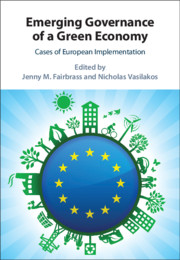Book contents
- Emerging Governance of a Green Economy
- Emerging Governance of a Green Economy
- Copyright page
- Contents
- Figures and Tables
- Contributors
- Preface
- Book Synopsis
- Acknowledgements
- Abbreviations
- 1 The Green Economy
- 2 The Green Economy
- 3 The Green Economy as Good Governance
- 4 On the Verge of a Second Revolution in the European Union’s Utilities Market for Energy Production?
- 5 ‘Great Expectations’
- 6 Overcoming Structural Disadvantages with Local Green Economies?
- 7 Shifting Models of Energy Companies towards Green Economy in Europe
- 8 Carbon Calculation and the Urban Green Economic Opportunity
- 9 The Green Economy
- Index
- References
8 - Carbon Calculation and the Urban Green Economic Opportunity
Published online by Cambridge University Press: 20 January 2021
- Emerging Governance of a Green Economy
- Emerging Governance of a Green Economy
- Copyright page
- Contents
- Figures and Tables
- Contributors
- Preface
- Book Synopsis
- Acknowledgements
- Abbreviations
- 1 The Green Economy
- 2 The Green Economy
- 3 The Green Economy as Good Governance
- 4 On the Verge of a Second Revolution in the European Union’s Utilities Market for Energy Production?
- 5 ‘Great Expectations’
- 6 Overcoming Structural Disadvantages with Local Green Economies?
- 7 Shifting Models of Energy Companies towards Green Economy in Europe
- 8 Carbon Calculation and the Urban Green Economic Opportunity
- 9 The Green Economy
- Index
- References
Summary
This chapter examines how definitions of the green economy and shaped by and seek to shape norms and discourses of economic development. It draws on multi-level governance theories alongside literature from critical accounting to investigate ways that urban policy actors have sought to make the case for investment in the green economy. The chapter aims to expand existing conceptualisations of the politics of calculation (in a multi-level governance context) to illuminate how calculations represent a range of assumptions about territory, the way people live and the nature of place and society in the present and the future. Empirically, the chapter focuses on a series of ‘Mini-Stern’ reports commissioned by urban governments in England that took as inspiration Nicholas Stern’s influential 2006 report on the economics of climate change. The chapter analyses how these reports use various calculative devices relating to carbon reductionin order to justify, de-risk and legitimise what might be seen as experimental or risky policy options; and the implications for how cities are represented as a result.
- Type
- Chapter
- Information
- Emerging Governance of a Green EconomyCases of European Implementation, pp. 127 - 147Publisher: Cambridge University PressPrint publication year: 2021

